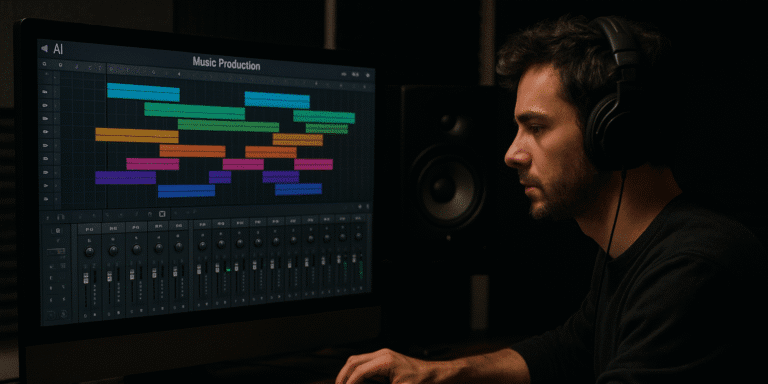The integration of Artificial Intelligence (AI) into the music industry has transformed the way music is created, produced, and experienced. With AI tools becoming more accessible, musicians and producers are using them to generate melodies, write lyrics, and even compose entire songs. As this technology advances, the question arises: Does AI enhance the creative process, or does it undermine the authenticity and emotional depth that define music?
While AI offers speed and new creative possibilities, some are concerned that over-reliance on technology may strip music of its human touch. The question remains: Is AI a blessing, helping musicians push boundaries, or a curse that risks diminishing the personal, emotional aspects of music?
The Benefits of AI in the Creative Process
AI’s primary advantage in music production is its ability to speed up the creative process. AI tools can quickly generate beats, suggest melodies, and help with songwriting, allowing musicians to experiment without spending excessive time on trial and error. For busy producers or independent artists, this speed can be a game-changer, providing a way to create high-quality music on tight deadlines.
AI also democratizes music production. In the past, producing professional-grade music required expensive equipment and access to high-end studios. Now, AI-powered software is available on laptops and even smartphones, making it possible for anyone to create music. This accessibility opens the door to a diverse range of musicians, allowing those without extensive resources to break into the industry.
Furthermore, AI offers opportunities for innovation. By analyzing vast amounts of data, AI can suggest new musical combinations that may never have occurred to the artist. This can help musicians step outside their comfort zones, experiment with unfamiliar genres, and generate fresh ideas that push the boundaries of traditional music.
Potential Risks: Over-Reliance and Emotional Disconnect
Despite its advantages, many critics are concerned about the over-reliance on AI in music production. While AI can generate technically impressive tracks, it may lack the emotional depth that human artists bring to their work. Music is often deeply personal, reflecting an artist’s experiences, emotions, and thoughts. Can an AI-generated song evoke the same powerful connection with the listener?
Another risk is that AI might homogenize the music industry. Since AI systems are trained on existing music, they often replicate popular patterns, styles, and trends. While this results in catchy songs, it may also stifle creativity and lead to music that feels formulaic or derivative. The more music is produced by machines, the less room there may be for original, unique sounds.
There is also growing concern that AI could lead to job displacement for musicians. If AI can produce entire songs more quickly and efficiently than human creators, will the demand for traditional songwriters, producers, and musicians decrease? As the technology improves, it may even be capable of composing entire albums or soundtracks, reducing the need for human involvement.
How AI is Shaping Live Music and Collaborations
AI’s influence isn’t limited to the studio. Some artists are using AI to enhance live performances. AI can analyze the crowd’s mood and adjust the music or visuals accordingly, creating a dynamic and personalized experience for the audience. This interaction between AI and live performance has the potential to revolutionize the concert experience, allowing artists to tailor their shows in real-time based on audience reactions.
Additionally, AI is making it easier for musicians to collaborate remotely. Artists from different parts of the world can now work together on a track using AI-generated compositions as a starting point. This opens the door to cross-cultural collaborations and genre-blending that wouldn’t have been possible without this technology. However, there are concerns that this shift could result in more impersonal collaborations, stripping away the human connection that comes from creating music together in person.
Ethical and Legal Concerns of AI-Generated Music
As AI continues to play a bigger role in music creation, legal and ethical concerns are emerging. One of the biggest issues is copyright. If an AI creates a song, who owns the rights to that music? Is it the developer of the AI, the musician who used the tool, or does it belong to the machine itself? As AI-generated music becomes more common, the industry is calling for clearer guidelines on intellectual property and ownership.
There’s also the question of originality. AI is trained on existing music, which means there’s a risk that AI-generated compositions may inadvertently copy melodies or structures that already exist. This could lead to concerns about plagiarism and the potential dilution of music’s creative integrity.
Is AI the Future of Music?
The role of AI in music is still evolving, and its future remains uncertain. For some, AI represents an exciting opportunity to push the boundaries of what music can be. It offers speed, innovation, and accessibility, creating new possibilities for musicians and listeners alike. However, there are significant risks to consider, such as the potential loss of emotional depth in music, the stifling of creativity, and job displacement for human musicians.
The key challenge will be finding a balance between embracing AI’s capabilities and preserving the unique, human elements that define music as an art form. AI can undoubtedly enhance the creative process, but its true value will depend on how it’s integrated into the broader music landscape. Whether AI is a blessing or a curse ultimately depends on how musicians and the industry navigate this technological evolution.


